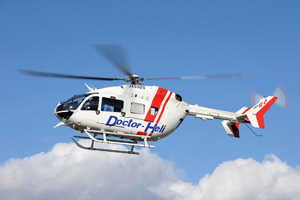Kawasaki BK117C-2 Medevac Delivered to Aero Asahi
Feb. 01, 2011

Tokyo, February 1, 2011 — Kawasaki Heavy Industries, Ltd. announced today that it has delivered its latest BK117C-2 helicopter to Aero Asahi Corporation. The new helicopter is the 17th C-2 model Kawasaki has delivered to the Japanese market where it will be used for emergency medical services.
The Kawasaki BK117 helicopter was developed jointly by Kawasaki and European helicopter manufacturer, Eurocopter Deutschland (ECD), formerly Messerschmitt-Bolkow-Blohm (MBB). The BK117 is a medium-sized twin-engine multi-purpose helicopter that’s used for everything from broadcasting, transporting cargo and passengers, fighting fires, to police and emergency medical services and more. When employed as a medevac, the large clamshell doors at the rear of the BK117 facilitate the quick transfer of patients in and out of the helicopter. Its roomy cabin also enables the onboard medical team to easily move around inside the helicopter as they provide care for the patient. These outstanding features as well as its compact body and superior mobility have earned the BK117 high marks around the world for emergency medical services.
The BK117 has been continually upgraded since its market debut in 1983. Cutting-edge technology and outstanding reliability have proven to be a winning combination for Kawasaki’s BK117 which has earned the distinction of being the bestselling model in the world today. Kawasaki has delivered 150 BK117s, and together with those delivered by ECD, there are over 850 in use around the globe.
|
|||||||||||||||||||||||||
*The EMS (emergency medical services) kit includes special medevac features such as a special cabin floor, a stretcher, seats for a doctor, nurse as well as a friend or family member of the patient, a wall-mounted rack for medical supplies, ceiling and wall rails, a forward-mounted medical cabinet, lights, as well as a dedicated power supply unit for medical equipment.





